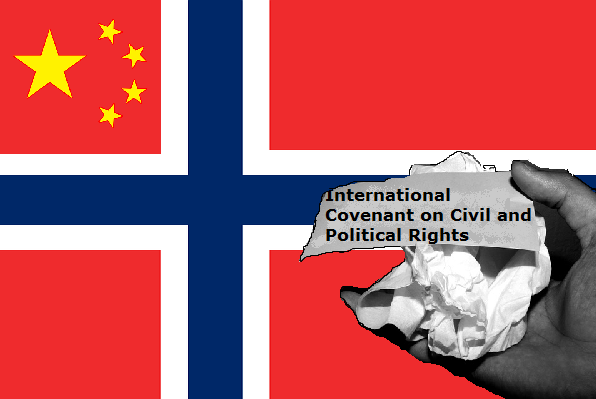 A group of Taiwanese nationals studying in Norway, labeled as “Chinese nationals” on visa and entry documents are taking their case to the Norway court system to redress the mistake.
A group of Taiwanese nationals studying in Norway, labeled as “Chinese nationals” on visa and entry documents are taking their case to the Norway court system to redress the mistake.
The case is being led by a law student, referred to only as Joseph, who has worked as a solicitor in Taiwan. He alleges that Norway’s classification of Taiwanese citizens as Chinese citizens infringes upon the rights of the individual as stipulated by the International Covenant on Civil and Political Rights.
Norway is a signatory country of the covenant, and if the court rules in favor of the students, then Norway would be legally bound to rectify the practice of mislabeling Taiwanese citizens, and forcing an illegitimate legal identity upon them as “Chinese.”
Upon investigation, it does appear that Norway’s mislabeling of Taiwanese citizens is in direct contradiction to Article I and Article II of the Covenant. The document also further stipulates that states found to be in violation of the covenant must rectify the contravention to the best of their ability.
Article I of the International Covenant on Civil and Political Rights states:
Sec. 1. All peoples have the right of self-determination. By virtue of that right they freely determine their political status and freely pursue their economic, social and cultural development.
Sec. 3. The States Parties to the present Covenant, including those having responsibility for the administration of Non-Self-Governing and Trust Territories, shall promote the realization of the right of self-determination, and shall respect that right, in conformity with the provisions of the Charter of the United Nations.
Article II also contains the following resolutions:
Sec. 1: Each State Party to the present Covenant undertakes to respect and to ensure to all individuals within its territory and subject to its jurisdiction the rights recognized in the present Covenant, without distinction of any kind, such as race, colour, sex, language, religion, political or other opinion, national or social origin, property, birth or other status.
Sec. 3: Each State Party to the present Covenant undertakes:
(a) To ensure that any person whose rights or freedoms as herein recognized are violated shall have an effective remedy, notwithstanding that the violation has been committed by persons acting in an official capacity;
If the declaration in Article I is intended to be interpreted as directly as it was written, then Norway is clearly in violation of the Covenant.
The Norwegian media outlet Aftenposten, quoted a member of the Norwegian Immigration Appeals Board as saying that altering the nationality of the students for the duration of their stay in Norway, in accordance with Norway’s “One China” policy, would not affect the rights or freedoms of Taiwanese nationals.
However, the students and many in Taiwan disagree. If there is ever a legal issue involving a Taiwanese person in the country, they have been legally relegated to the unwelcome status of “Chinese citizen” and would be subject to the authority of the Chinese embassy in the country.
As Joseph and others argue, this would contravene the international standards of political rights, as China is neither their home nor is the PRC their representative government.
Joseph is quoted by Afterposten as saying “It’s illogical. I am from Taiwan. I have a Taiwanese passport which I used to enter Norway.”
The students are preparing to establish a Go-Fund me account to finish raising the funds necessary to appeal the case in the Norway courts (NT$900,00 / US$30,000). If arbitration in Norway fails to reach a just ruling, then the students are prepared to take the Norwegian Immigration Appeals Board to the European Court of Human Rights.
